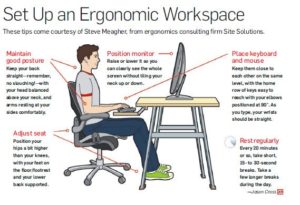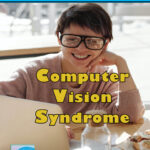Health issues for computer users : How to prevent it? With the advancement of technology over the years, world is becoming more and more dependent on Information technology. Apart from Computers and laptops, now we have smart phones with frequent tech updates. The information technology is not only used by IT professionals but even other professionals like advocates, doctors, chartered accountants etc more and more. Now even the common man is using information technology for his daily needs. App based services are in vogue now, so from adults to children everyone is using computers, smart phones and other gadgets frequently.
In our practice we are seeing many patients of IT back ground with various health problems ranging from physical illness to emotional and psychological problems.According to an article in Computer World magazine there will be over 5.2 million software professionals in India and it is increasing. Increases in number of software professionals means increase in health problems. Clinical studies done in India have found that software engineers who work long hours suffer mostly from musculoskeletal problems, eye problems and psychosocial issues.
Common Health Problems
1. Lower Back Pain: This is probably the most common problem suffered by IT professionals. Almost 80% of people who spend more than 8 hours in front of a computer which can lead to great stress on bony joints and cartilages of back leading to back pain. The problem lies in wrong posture and not taking frequent breaks in between the work. On a long run persistent stress & strain on the bone and ligaments leads to structural changes in the back bone thus leading to a chronic back pain.To prevent back pain refer the picture in this article that demonstrates the right posture while working in front of computer.

2.Carpal Tunnel Syndrome(CTS): I had a patient who was an IT professional who was diagnosed to be suffering with CTS. she was in such as bad condition that she was unable to lift or hold even tea cup with her hand, and her hand muscles had become so thin and weak. She became alright after few months of treatment. Carpal tunnel syndrome is a condition where a nerve known as median nerve that passes through the wrist gets compressed due to constant but restricted movement of the wrist joint. The tendon inflammation resulting from repetitive work, such as uninterrupted typing, can cause carpal tunnel symptoms. Carpal tunnel syndrome from repetitive maneuvers like uninterrupted typing has been referred to as one of the repetitive stress injuries.
Symptoms of CTS:
- Numbness and tingling of the hand, thumb, index, middle, and thumb side of the ring fingers.
- Pain is worse at night & person may have sleepless nights.
- As disease advances—Burning sensation, weakness of hand.
- Decreased grip strength leading to frequent dropping of objects from the hand.
- Occasionally, sharp shooting pains can be felt in the forearm.
- Chronic carpal tunnel syndrome can also lead to wasting (atrophy) of the hand muscles, particularly those near the base of the thumb in the palm of the hand.
How to Prevent CTS:
- Frequent stretches and bending of wrists can loosen up the tight tissues, improve blood flow and reduce pain and stiffness.
- Keep your keyboard at a height where the elbow is at 90 degrees to the table. Keep your elbows close to your side. Keep your arms rested on the arm rest with your forearms parallel to the ground.
- Using gel pads to support the base of your palm is okay for a short while, but not for long. The altered angle due to the gel pads can worsen CTS.
- Adjust the position of your keyboard as well so that it is comfortable to type.
- Don’t sit and type for hours, take short breaks in between and exercise the joints of your hand.
3.Anxiety and Stress: Targets and deadlines! Hearing these two words is enough to induce stress and anxiety in most of IT professionals. I have seen some of my IT patients and friends who work for 18-20 hrs a day, even in weekends to meet the set goals. As per a recent survey published in a psychological journal, IT professionals and people who are addicted to internet were more likely to develop depression. Depression can greatly affect quality of life. It also can have a negative impact on personal relationships as well.
Tips to avoid/minimize anxiety & stress:
- Don’t carry your work to home, limit your work to work place only.
- Limit your use of the internet when at home. Instead, use the time to spend with family or take up a hobby.
- Exercise is of course a great way to ward off stress, I advise my patients group events like cricket, badminton, foot ball etc rather than monotonous activities like running, swimming, cycling etc. I have observed that group events are more beneficial as it helps people to interact with each other, and helps to forget their stress and worries; it relaxes both your body and mind.
- Yoga and relaxation therapies are also an effective way to keep stress and anxiety levels low. The Pranayama is believed to be very helpful.
4. Heart Diseases: Research has linked sitting for long periods of time with a number of health concerns, including obesity and metabolic syndrome — a cluster of conditions that includes increased blood pressure, high blood sugar, excess body fat around the waist and abnormal cholesterol levels. Too much sitting also seems to increase the risk of death from cardiovascular disease and cancer.
Guidelines to prevent Heart diseases:
1.Avoid sitting for long hours, make sure you get up once every 15 to 20 minutes.
2.Go for a short walk around the office taking some break from work.
3.Once you finish work, indulge in a good exercise program.
4.You could go for a walk or a jog or even hit the gym if you are a member.
5. Insomnia: Insomnia or difficulty sleeping is one of the common health problems seen in software professionals. This is encountered more in people work in night shifts, as their normal sleep rhythm is disturbed and their day time sleep is poor & inadequate. A study in Finland found that 16% of IT professionals who work late develop insomnia. Another study looking at 91 software engineers in India found that 35% of them had mild insomnia while 21% had severe insomnia. Staring at a bright screen (be it your laptop or mobile) late into the night can alter the release of the sleep chemical melatonin. As time passes, the release of this hormone alters permanently, leading to chronic insomnia.
Guidelines to prevent Insomnia:
- Try to get at least 6 hours of sleep (recommended is 8 hrs),
- Switch off tv and mobile phone once you hit the bed.
- Use dim lights in bed room and read a book if needed.
6. Neck Pain: Sitting for hours in same posture and staring at a computer screen can cause neck pain, which can later develop into neck stiffness. It is not just the staring at the screen for long hours that causes the problem; placing the phone in between your ears and your shoulder is also a trigger for neck problems (Call center workers, Stock brokers). In a research study it was found that 59% of WRMSDs (Work related musculoskeletal disorders) reported annually by IT professional in India, out of which 30% cases are of neck pain.
Guidelines to prevent getting Neck pain:
- Right posture while sitting is most important.
- If using a laptop, use adequate support to keep the computer elevated at eye level.
- Avoid using mobile phones for long hours. If you do, use a hands free kit instead of holding onto the phone all the time.
- As mentioned previously it is important to keep moving and avoid static postures.
7. Computer vision syndrome: Those who spend most of their time staring at a computer screen are prone to suffer with a condition called as computer vision syndrome. Computer vision syndrome is characterized by dry eyes, red eyes, sensitivity to glare, pain around the eyes, headache and overall fatigue. Nearly 7 out of 10 people who spend 8 to 12 hours a day staring at a computer screen will develop eye problems. Around 80% of individuals with eye problems hail from the IT profession, according to a report in Times of India.
To prevent Eye strain
- Follow the 20-20-20 rule. Every 20 minutes, look away from the computer screen at an object around 20 feet away for duration of 20 seconds.
- Using anti-glare screen covers can reduce eye strain significantly and reduce your chances of developing computer vision syndrome
- Avoid using your computer in a dark room.
8. Deep vein thrombosis : Deep vein thrombosis refers to a condition where blood clots form in the deeper veins in the legs. It is one of the usual health problems in software professionals. Usually the impure blood (deoxygenated) in our legs is pumped back to heart and then lungs for purification (oxygenation) this is a regular ongoing process; sitting for long hours without any activity can make blood to stagnate in the blood vessels of our legs which lead to clot formation. This can lead to development of a condition known as Deep vein thrombosis.
According to a report in New Scientist, clot formation in the calf muscles in computer users is now called ‘e-thrombosis’. This term was coined after a computer enthusiast developed a clot that broke off and migrated to his lungs.Blood clots may lead to death when they dislodge from their sit of origin (leg veins) and travel up and settle in the major vessels of lung (pulmonary embolism) resulting in blockage of blood circulation to vital organs.
To prevent Deep vein thrombosis:
- Keep moving about. Don’t remain seated in one position all the time.
- Take a short walks often, this will help the blood circulate from your leg back to your heart.
How Homoeopathy can be helpful?
Majority of the health issues faced by IT professionals can be effectively treated by using Homeopathy medicines. It has holistic approach towards patient which means treating patient as a whole and not his specific disease or parts of body. These medicines not only help in relieving the suffering of the patient but also stimulate and strengthen the immune system of the body. Homeopathy medicines not only relieve the physical sufferings but also act on the level of mind and help the patient to adopt himself to the challenging situations in work place or anywhere else without getting much stressed, thus a harmony (balance) is established.
In our clinics we have effectively treated many patients from IT back ground suffering with low backache, dryness of eyes, carpel tunnel syndrome, anxiety, depression, Insomnia, neck pain etc….IT professionals and other professionals who spend many hours in front of computers are very prone to developing various health problems, which can be prevented if right, corrective steps are taken early. Homeopathy as a holistic system of medicine can play a major role in relieving the suffering of these people as it is cost effective, non-invasive, non addictive and there are no side-effects from Homoeo medicines.


Dr. Tejaswi K.P.
Reader- Dept. of Surgery, Bhagwan Buddha Homeo Medical college, Bangalore
Consultanat- Surabhi Homoeo clinic, Vidyaranyapura, Bangalore-97
Mob-97311 33819 Email-drtejas2000@rediffmail.com











